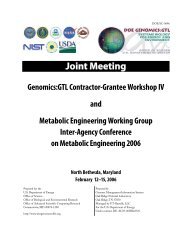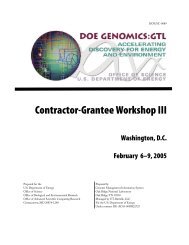Joint Meeting - Genomics - U.S. Department of Energy
Joint Meeting - Genomics - U.S. Department of Energy
Joint Meeting - Genomics - U.S. Department of Energy
You also want an ePaper? Increase the reach of your titles
YUMPU automatically turns print PDFs into web optimized ePapers that Google loves.
Welcome to the 2008 <strong>Joint</strong> <strong>Genomics</strong>:GTL<br />
Awardee Workshop and the eighth Metabolic<br />
Engineering Interagency Working Group<br />
Conference. The <strong>Genomics</strong>:GTL program supports<br />
fundamental research on microbes and plants with<br />
an emphasis on understanding systems biology<br />
across multiple scales <strong>of</strong> organization. Molecular<br />
interactions among proteins, regulatory networks<br />
and metabolic pathways <strong>of</strong> individual organisms,<br />
and multicellular interactions in complex microbial<br />
communities are explored using advanced molecular<br />
and computational biology approaches enabled by<br />
genome sequencing. Research supported by the<br />
<strong>Genomics</strong>:GTL program addresses critical DOE<br />
missions in bioenergy, bioremediation <strong>of</strong> environmental<br />
contaminants, and biogeochemical cycling<br />
and biosequestration <strong>of</strong> carbon.<br />
The past year has seen many exciting new developments<br />
for the <strong>Genomics</strong>:GTL program. In June<br />
<strong>of</strong> 2007, Secretary <strong>of</strong> <strong>Energy</strong> Samuel Bodman<br />
announced the funding <strong>of</strong> three multidisciplinary<br />
Bioenergy Research Centers aligned with the GTL<br />
program. Each center represents a multidisciplinary,<br />
collaborative effort between DOE national laboratories,<br />
universities, and private companies aimed at<br />
improving digestibility <strong>of</strong> lignocellulosic biomass<br />
from bioenergy feedstocks, discovery and bioengineering<br />
<strong>of</strong> new microbes and enzymatic systems<br />
capable <strong>of</strong> breaking down cellulose, and conversion<br />
<strong>of</strong> cellulose-derived sugars to ethanol or other bi<strong>of</strong>uels.<br />
<strong>Genomics</strong>:GTL continues to support groundbreaking<br />
research by individual investigators and<br />
interdisciplinary research teams, and new efforts in<br />
technology development for imaging lignocellulose<br />
degradation, validation <strong>of</strong> genome sequence annotations,<br />
characterizing complex microbial communities,<br />
and quantitative biochemistry and metabolic<br />
Jerry Elwood<br />
Acting Associate Director <strong>of</strong> Science for<br />
Biological and Environmental Research<br />
Office <strong>of</strong> Science<br />
U.S. <strong>Department</strong> <strong>of</strong> <strong>Energy</strong><br />
Welcome<br />
Michael Strayer<br />
Associate Director <strong>of</strong> Science for<br />
Advanced Scientific Computing Research<br />
Office <strong>of</strong> Science<br />
U.S. <strong>Department</strong> <strong>of</strong> <strong>Energy</strong><br />
engineering for biological hydrogen production<br />
were funded in 2007. The <strong>Genomics</strong>:GTL program<br />
in Ethical, Legal, and Societal Issues (ELSI) also<br />
continued to expand in 2007, incorporating new<br />
projects that address societal and sustainability<br />
issues associated with bioenergy development. The<br />
diverse array <strong>of</strong> approaches represented by these<br />
new projects and the existing <strong>Genomics</strong>:GTL community<br />
form a robust and highly complementary<br />
research program that engages some <strong>of</strong> our most<br />
pressing national priorities.<br />
For the third year, this meeting brings together<br />
researchers supported by the <strong>Genomics</strong>:GTL<br />
program and the Interagency Metabolic Engineering<br />
Working Group. The goal <strong>of</strong> the Metabolic<br />
Engineering Working Group is the targeted and<br />
purposeful alteration <strong>of</strong> metabolic pathways found<br />
in an organism in order to better understand and<br />
use cellular pathways for chemical transformation,<br />
energy transduction, and supramolecular assembly.<br />
In addition to overlapping technological approaches,<br />
these two programs share an underlying conceptual<br />
goal <strong>of</strong> advancing understanding <strong>of</strong> organisms at the<br />
systems level.<br />
We look forward to an exciting and productive<br />
meeting and encourage you to exchange ideas and<br />
share your expertise with other researchers. We<br />
thank you for lending your knowledge, creativity,<br />
and vision to <strong>Genomics</strong>:GTL and the Metabolic<br />
Engineering Working Group and wish you continued<br />
success in the coming year.<br />
Fred Heineken<br />
Chair <strong>of</strong> the Interagency Metabolic<br />
Engineering Working Group<br />
National Science Foundation





